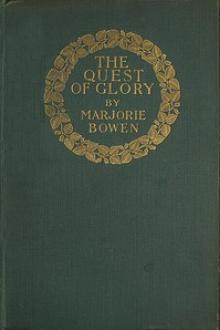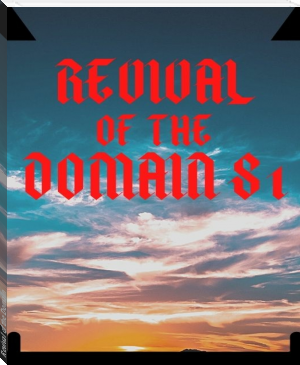The Quest of Glory by Marjorie Bowen (book recommendations based on other books .txt) 📕

- Author: Marjorie Bowen
- Performer: -
Book online «The Quest of Glory by Marjorie Bowen (book recommendations based on other books .txt) 📕». Author Marjorie Bowen
toneless voice—
“The cursed woman was a heretic.”
The Italian seemed amused.
“M. de Richelieu is working hard to purify Languedoc,” he remarked.
“What was her punishment?” asked Luc.
“An easy one,” returned the priest—“she will be hanged.”
Luc turned his head towards the speaker.
“Because she is a heretic?” he asked slowly.
“What else?”
The angry blood stained the Marquis’s delicate face. He knew these
things happened, but he had never before been brought close to them.
“You make me feel ashamed of my humanity,” he said. “Are you a
Protestant?” demanded the priest.
“No.”
“Perhaps you do not believe in the Gospels?” urged the other
maliciously.
Luc gazed at him with a kindling scorn.
“Neither in Gospels, nor Christ, nor God,” he said sternly, “nor any of
the symbols superstition uses—nor in anything you and your kind
worship.”
The priest was taken aback for a moment and did not answer, but the
Italian remarked cheerfully—
“A follower of M. de Voltaire.”
“A follower of no man,” returned Luc wearily. Some minutes passed while
the three horsemen seemed to be waiting silently. Then Luc moved his
horse away in the direction of the high road; he had seen the soldiers,
without their prisoner, and the straggling crowd coming back over the
crest of the hill.
The Italian cried after him—
“Are you for Avignon to-night, Monsieur?”
He answered without looking back. When he reached the main road again
the dark clouds that had been lowering all day broke and a steady rain
began to fall, hastening the short autumn twilight. After perhaps half a
league the road branched. The Marquis turned to the left, but soon
perceived that he had missed his way, for the dark was descending, and
there was no sign of the walls of Avignon on all the wide, gloomy
horizon.
The rain was steady, cold, and seemed not likely to cease. The only
building in sight was a deserted farmhouse with the roof half gone and
weeds and fallen masonry choking garden and yard.
Some of the lower rooms were, however, dry and sheltered, and in one of
them Luc, his servant, and the two horses took refuge for the night.
The Marquis, roused by his servant, woke to see the man standing in
misty moonlight by the square of window; with a languid distaste at
being called from sleep Luc rose.
“Monsigneur,” said the servant in a low voice, “there are those two, the
foreigner and the priest, and a third with them just gone into the
barn.”
He pointed to a building close to the house, from the large doorway of
which came a great blaze of light, strong and fitful, as if caused by a
bonfire.
The reflection of it trembled over the rough floor of the room, and it
was this that had aroused the servant to look from the window, when he
had, he declared, seen three men carrying lanterns cross the yard and
enter the barn; he swore to two being the Italian and the priest.
Luc considered; his curiosity was certainly roused and a sense of
distrust also. The barn was so lonely, the two strangers so peculiar in
appearance—and he recalled how the Italian had called after him, “Are
you going to Avignon to-night?” as if he wished to be sure that he would
be out of their way.
“What can it be?” he murmured to himself, and he thought of coining.
The light from the barn was increasing in intensity as he watched it,
and presently began to take on an artificial red tinge that lit up
windows and door with a lurid glow.
“I think they practise fireworks,” smiled Luc. He put on his hat, took
up his sword, and quietly stepped out into the dreary farm-yard,
followed by his servant.
The first objects that he beheld were three horses fastened to the stump
of an elder tree: two, those ridden by the travellers he had met
yesterday; the third, a black horse of great beauty. Keeping in the
shadows of the house, and avoiding the long trails of flickering light,
Luc and the servant gained the barn and crouched against the wall of it,
endeavouring to find some aperture. Voices raised loudly and angrily
came from within, among them the tones of the Italian speaking in his
own language with great vehemence.
At length Luc found a considerable hole in the loose and rotting beams
that composed the walls of the barn and, looking through, saw an
extraordinary scene.
In the centre of the building stood an iron brazier, which held a large
fire of vivid leaping flame; round this was drawn a chalk circle marked
with various figures and symbols, and beyond that a ring of dead frogs
and snakes.
Behind the brazier stood the Italian attired in a sweeping black robe
and a scarlet skullcap; he held in one hand a long white wand and in the
other a closed parchment-covered book.
Beside him stood the priest regarding him with an expression of
impatience and vexation. The exceeding brightness of the flames threw
over the features of both a glow of red, and gave even their dark
garments something of the colour of blood.
A third man was facing these two. He was standing quite close to Luc; he
had his hands behind his back, and wore a long tabinet riding-cloak; his
slight figure, scarcely of the medium height, was of a remarkable grace;
his hair was clubbed and unpowdered. Luc could only see his profile,
which was sensitive, attractive, and high bred.
This last man was manifestly a noble, which caused Luc some surprise. He
was gazing at him with curiosity when the priest suddenly moved and
disclosed a fourth occupant of the barn. Luc gave a long shudder of
horror and moved back from the hole.
It was the dead body of the heretic peasant woman, sitting upright in a
rude chair with the rope still round her swollen throat and the harsh
flare over her disfigured face, dropping jaw, and staring eyes.
“What is it, Monseigneur?” asked the servant eagerly.
“Have your pistols ready,” answered Luc in a stern whisper, “and get to
some vantage where you can see what is going on within.”
The man obeyed, creeping away through the mingled moonlight and
firelight until he found another notch in the wood of the wall.
Luc again looked into the barn. The priest had now thrown on some powder
that filled the whole building with smoke, the Italian was shouting
short sentences in an uncouth language, and the third man had sprung
forward and was staring at the corpse through the soft film of the
bluish smoke.
“She does not speak!” he cried. “She does not speak!”
The priest gave a furious exclamation and cast something dark and heavy
into the flames, and the Italian tore a chain from his neck and flung it
in the lap of the dead woman. A towering red and orange flame, that
seemed as if it would set the roof on fire, suddenly shot up from the
brazier, an unearthly and awful voice called out—
“Beware of she who comes from Bohemia!”
This was cut short by a passionate ejaculation; who it came from Luc
could not tell. All three men seemed to run together; the brazier was
overturned, and there was perfect darkness, broken by a shriek, a groan,
several short cries of fury, and the rip of unsheathing swords. Luc ran
round to the doorless opening that was the main entrance to the barn; as
he reached it a man came rushing out with a weapon in his hand, bare in
the moonlight. Luc seized him and flung the sword away. The servant had
come up now and stood ready with his pistol.
“Explain yourself,” demanded the Marquis.
The other, completely taken by surprise, wrenched himself free, but made
no attempt to escape.
“Are you the Devil?” he asked, with more eagerness than fear.
“No,” answered Luc in brief disgust.
Before he could say more the priest came out of the barn carrying a
lantern.
“What is this foul mummery?” asked Luc sternly. “I shall speak to the
Governor.”
Seeing his companion in the power of a stranger, the priest gave a cry
and made as if he would fly into the night.
But the other turned on him fiercely.
“By God, you are wanted here!” he cried, and the priest came back
instantly.
“This is a creditable affair for one of your cloth to be involved in,”
said Luc.
The priest ignored the comment, but his companion remarked with a great
degree of haughtiness—
“I suppose I have been disarmed by a gentleman?”
“Oh yes,” answered Luc quietly. “Take up your sword.”
The stranger turned and looked for it by the aid of the priest’s
lantern.
“Where is the Italian?” asked Luc.
“Escaped,” returned the other carelessly, slipping his weapon into the
scabbard.
“The rascal ran out by the back way,” added the priest.
“He hath left his horse,” remarked Luc, glancing at the three beasts.
“Being far too frightened to think of it,” was the answer, and the
stranger, with a sudden show of pleasantness, came up to the Marquis and
laid his hand on his shoulder.
“Come, my dear fellow,” he said, “do not look so grave. We have been
endeavouring to raise the Devil and have made a failure of it, that is
all.”
“A stale game,” said Luc scornfully. “And you were profaning the dead,
Monsieur.”
“A peasant! A heretic!” cried the other, with an instant return of
haughtiness. “And who are you to call me to account?” At this the
priest touched him on the arm, and he added in a quiet tone, “You are
scarcely a spy, Monsieur.”
“No,” said Luc wearily. His anger had changed into mere disgust.
“No—you know you were doing an illegal thing, a foolish thing, and a
horrible thing; but I am no judge of your actions. I will forget you,
Monsieur. Only I ask you to give that poor creature decent burial.”
He was turning away when the other caught him by the sleeve.
“Who are you?” he asked curiously. “I should like to know you. You speak
like M. de Voltaire.”
Luc had instantly resolved not to give his name.
“I am a private citizen of Provence,” he answered, “and I have business
in Avignon. The rain is over and I have had some rest, also I do not
care to remain here, so I will now ride on to the town.”
He made a grave bow and was turning away when the other again detained
him.
“You cannot ride to Avignon till it is light. Come with me—my name is
Armand, Monsieur Armand—I do not ask yours.”
“And I have not yours,” answered Luc.
The other laughed.
“Armand for to-night—and I swear it is my christened name. There is
supper in the house—I give you an invitation.”
The priest seemed impatient to be gone and annoyed at this conversation,
but Luc, despite his distaste of the whole thing, was interested in the
stranger, in his very shamelessness, in his peculiar, gentle address, in
his mention of M. de Voltaire. He felt curious to see this man’s person,
for they stood now in the shadow of the barn, and the priest kept his
lantern turned carefully away.
“Monsieur,” answered Luc, “at present I





Comments (0)